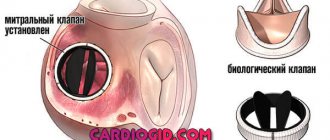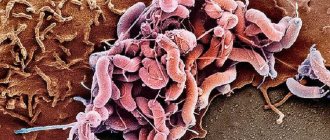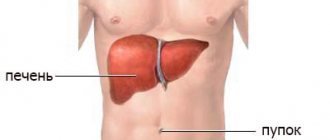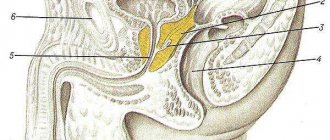Causes of chronic renal failure
The content of the article
In adults, impaired kidney function can be caused by various diseases. The most common ones are:
- diabetes;
- high blood pressure and arterial sclerosis (coronary kidney disease);
- non-infectious kidney inflammation (glomerulonephritis, glomerulopathy);
- urinary tract infections and tumors;
- hereditary kidney disease (polycystic kidney disease);
- long-term use of painkillers, analgesics (analgesic nephropathy);
- malignant tumor.
Diabetes
Ischemic kidney disease
Treatment of deficiency in pregnant women
Kidney failure affects pregnant women in the last months most often due to inflammation and late toxicosis (preeclampsia). The woman is urgently sent to the hospital. Treatment, like the deficiency itself, will not go unnoticed for the developing fetus, so the doctor makes decisions regarding certain measures.
Therapeutic actions are directly related to the cause of the pathology and the severity of the condition:
- Protein foods are excluded from the menu;
- the amount of fluid is restored through droppers;
- antibiotics are prescribed to fight infections;
- in severe cases, hemodialysis cannot be avoided.
After kidney failure, only a caesarean section is used to give birth to a child. You can plan your next pregnancy after complete resumption of all kidney functions.
Can kidney failure be prevented?
In many cases yes. If the cause of this condition is addressed, it is possible that kidney failure will not worsen further. The less functional tissue is destroyed, the more likely it is that the kidneys can continue to function.
Healthy kidneys have a large reserve capacity. Even the loss of one kidney is not a problem for the body, so there is also the possibility of kidney transplantation from a living donor. However, there are diseases, or certain stages of them, that almost always lead to irreversible kidney failure.
Symptoms of the disease
As mentioned above, kidney function in this condition can be fully restored if you consult a doctor in time. This disease can develop over a short period of time, from several hours to seven days.
This condition lasts from a day or more. The main thing is not to ignore the symptoms if it is acute renal failure. Treatment should be prescribed immediately.
The development of the disease can be divided into 4 stages.
The first period - shock - lasts a couple of days. The following symptoms appear:
- Chills.
- Increased body temperature.
- Pale or yellowish skin.
- Tachycardia, low blood pressure.
In the second period, urine stops forming, nitrogen and phenol accumulate in the blood. It lasts approximately one to two weeks and also has the following manifestations:
- Lost appetite.
- Weakness, headache, dizziness.
- Insomnia.
- Nausea and vomiting.
- Smell of ammonia.
- Possible pulmonary edema.
The third period is called recovery, the condition may improve, or it may worsen. In some cases, a person develops an appetite and begins to feel much better.
The fourth period is also a recovery period, it is characterized by the fact that:
- The indicators are returning to normal.
- Kidney functions are restored.
This period can last from several months to several years.
However, it is worth noting that with this disease, liver cells are also damaged, which explains the yellowness of the skin. If there was an acute condition, its symptoms may be reminiscent of the disrupted functioning of internal organs, for example, the liver or heart muscle, for another year or two.
What are the possibilities for early detection of kidney disease?
There are certain ways in which certain kidney diseases can be detected early. What should you pay attention to?
Renal function should be checked in the following cases:
- if you have diabetes;
- high blood pressure, especially if it gets worse suddenly or is difficult to treat;
- tumor of unknown origin;
- when blood or protein is found in the urine;
- if you have kidney disease (for example, polycystic kidney disease).
Prevention
No special measures have been developed to prevent the pathological condition. Prevention of illness consists of regular examination of people with hereditary kidney diseases. In addition, people who have suffered a severe burn, frostbite, or injury to the lower back should see a doctor immediately.
If treatment is started in a timely manner, the functionality of the organs may not be affected or the disorders will not be so complex.
Kidney failure is not a death sentence. Even at the terminal stage of the disease, when the patient is on hemodialysis or waiting for an organ replacement, all is not lost. The desire to live, coupled with well-chosen therapy, will defeat any pathological process.
What symptoms of kidney disease can you notice?
Very often, even at an advanced stage of kidney disease, the patient may not experience any special problems.
The most common symptoms that may be related to kidney disease and should be investigated are:
- weight gain due to fluid retention (swelling of the face, eyelids, legs);
- pain in the lumbar region, especially if it is accompanied by fever or discoloration of urine (infection, stones, cyst rupture);
- formation of foam in the urine (may be associated with the release of protein in the urine);
- dark urine (red, red-brown, pink);
- too much urine (especially at night);
- too little urine (if the urine is less than half a liter per day, this means severe kidney failure);
- muscle weakness, loss of appetite, muscle spasms, change in skin color.
Pain in the lumbar region
Swelling of the legs
Loss of appetite
Degrees
Among domestic specialists, the urological classification developed in 1973 by I. N. Kuchinsky and N. A. Lopatkin is considered the most complete and verified.
The proposed systematization divides renal failure into 4 stages:
- latent;
- compensated;
- intermittent;
- terminal.
Latent or stage 1 of the disease does not manifest itself in any way. The patient complains of fatigue, loss of performance and weakness, associating these symptoms with ordinary malaise, a cold or PMS. However, even in the absence of signs of disease, pathological changes begin to occur in the body.
The compensated stage is manifested by minor disturbances in the activity of the kidneys: the daily volume of urine increases, the urge to urinate becomes more frequent, and the osmolarity of urine decreases. Fading kidney functions at this stage are compensated by other organs, so proper treatment can keep the disease within certain limits and prevent it from moving to the next stages.
Intermittent renal failure manifests itself with a more intense clinical picture. The symptoms become brighter, the condition of the skin changes - the dermis becomes sallow in color and sags. As a rule, stage 3 renal failure is accompanied by nocturia and polyuria, the patient becomes susceptible to all kinds of infections, weakness and joint pain appear.
The terminal stage largely depends on the degree of damage to the main body systems. As medical practice shows, several years may pass from the moment the last phase is identified before the use of hemodialysis. In this regard, Soviet scientists created another classification, dividing the terminal stage into several degrees of renal failure.
What tests are performed if kidney failure is suspected?
Basic laboratory tests:
- chemical analysis of urine;
- microscopic examination of urine sediment;
- blood analysis.
Blood and urine tests
If kidney disease is suspected, the patient is referred to a urologist or nephrologist as needed.
A urologist is a surgical specialist who treats various methods, such as kidney and urinary tract tumors, stones in the urinary tract, etc.
A nephrologist is a highly specialized doctor who deals with kidney failure. It treats severe kidney damage associated, for example, with diabetes, immune metabolic disorders or high blood pressure. This doctor also treats patients with acute and chronic renal failure, prepares patients for kidney transplantation, etc.
Treatment with folk remedies
If kidney function is impaired, medicinal herbs with diuretic properties have a good effect. Infusions and teas are prepared from plants, and decoctions are added to a warm bath.
Best herbs for kidney failure:
- lingonberry leaf;
- bearberry;
- corn silk;
- chamomile;
- horsetail;
- birch leaves and buds.
It is recommended to brew herbal infusions in a thermos and take them hot at least 3 times a day. It should be remembered that herbal medicine is used only as an adjuvant to drug treatment and must be prescribed by a doctor. In some conditions of the body, herbs are contraindicated.
How is chronic renal failure treated?
Treatment may vary depending on the cause of chronic kidney failure and how much kidney tissue was removed. Destroyed kidney tissue does not have the ability to restore function, and therefore chronic renal failure is an irreversible process.
If the cause is obvious, try to treat the cause to prevent further kidney damage. In any case, even if the cause cannot be corrected or is unknown, residual renal function should be preserved for as long as possible.
The nephrologist prescribes a special diet and some medications to stop further kidney failure. These are mainly drugs to lower blood pressure (hypotensive drugs), drugs to influence the activity of the parathyroid glands, the function of which is often increased (phosphate binders and active forms of vitamin D), drugs to treat anemia (vitamins, iron supplements, erythropoietin injections), metabolic and others, for example, amino acid keto analogue.
With effective treatment, you can delay the need for kidney replacement for several years and prevent many of the serious complications that can accompany kidney failure.
ONLINE REGISTRATION at the DIANA clinic
You can sign up by calling the toll-free phone number 8-800-707-15-60 or filling out the contact form. In this case, we will contact you ourselves.
If you find an error, please select a piece of text and press Ctrl+Enter
Complications
The most common complications of kidney failure are infectious diseases (sepsis), cardiovascular disorders and uremic coma.
How long do people live with kidney failure? It is difficult to answer this question. It all depends on the degree of organ damage and the presence of complications or concomitant pathologies. It is also important which disease caused the functional deficiency.
If we talk about approximate data, the statistics are as follows: patients receiving replacement therapy live 5–7 years. Hemodialysis prolongs life by 22–23 years. If the kidneys fail, a transplant is performed, which adds at least 25 years to life.











